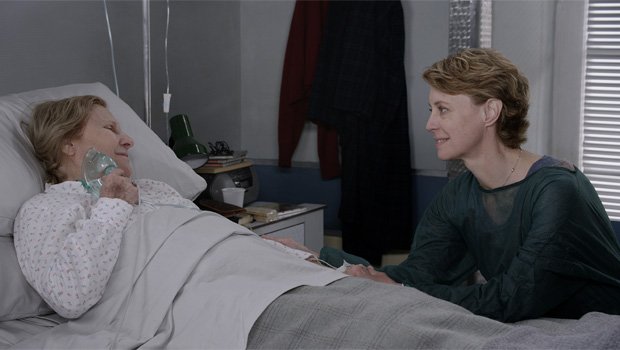My Mother (Mia Madre) reaction: Cannes 2015
Cannes favourite Nanni Moretti returns to the festival with an impactful meta-dramedy. Here’s Jordan Farley’s reaction…
Nanni Moretti is one of the Cannes Film Festival’s big hitters. The Italian filmmaker took home the Palme d’Or in 2001 with his heart-wrenching, semi-autobiographical drama The Son’s Room, so it’s no surprise that his latest, My Mother, drew a crowd that left even Mad Max: Fury Road in the dust. If the effusive applause that greeted the film’s cut to credits was anything to go by, most did not leave disappointed.
Margherita Buy stars as Margherita, a movie director and daughter to a dying mother (Giulia Lazzarini). On set and in the real world Margherita’s life is unravelling: she’s broken up with her boyfriend, has an adolescent daughter to look after and is struggling to reconcile with the fact that her mother doesn’t have long to live. Her brother Giovanni (Moretti himself) is there to help, having quit his job to make their mother’s stay in hospital as comfortable as possible, but Margherita’s attentions are elsewhere – on her movie. The shoot is complicated by the arrival of loud mouth American actor Barry Huggins (a brilliant John Turturro), whose loose grasp of Italian and larger than life presence cause huge problems.
In recent years, Moretti has shifted his focus to acerbic satires such as the Silvio Berlusconi skewering Il Caimano, but My Mother sees him return to the touching family drama of The Son’s Room. And just like The Son’s Room, the film has an autobiographical edge – it’s based on Moretti’s experience of losing his own mother during the editing of We Have A Pope. It’s a tender account of long, drawn out loss, Buy brilliantly portraying a woman keeping her grief and guilt largely internalised but plain to see behind her weary, devastated eyes. It manages to be poignant without ever feeling overwrought.

This restraint is helped by the film’s unusual flipside – the making of Margherita’s movie, a socially conscientious drama about a factory being bought out by John Turtorro’s entrepreneur. These scenes play out like a broad comedy, with Huggins continually fluffing his lines, telling people about the time he worked with Kubrick (he didn’t) and, in one laugh-out-loud sequence, driving a car with so many cameras mounted on the front he can’t see out of the windshield. At times it feels like Moretti has made a cut and shut movie, welding together two completely different films, but somehow it works – the filmmaker effortlessly shifting the pace and tone of the tale in the blink of an eye.
Just like the scenes in the hospital there’s a self-conscious, meta element to the filmmaking comedy too – Moretti poking fun at his own quirks as a director. We wouldn’t be surprised if Margherita’s baffling advice that she wants to see “the actor stood beside the character” is a line Moretti has used himself once or twice. At one point during a press conference on set Margherita responds to a question about her film’s social conscience by saying audiences “ask us for films that aren’t just entertainment.” It’s a request that Moretti has directly addressed with My Mother – a film that entertains, and much more besides.
Shot simply but elegantly, it doesn’t quite have the impact of Moretti’s best work (it’s too gentle for that to be the case) and the occasional flashbacks/dream sequences feel largely unnecessary or just downright confusing, but Moretti has returned to Cannes with his finest film in years.
Bringing all the latest movie news, features, and reviews to your inbox
In partnership with Microsoft, powered by the HP Spectre 360
The Total Film team are made up of the finest minds in all of film journalism. They are: Editor Jane Crowther, Deputy Editor Matt Maytum, Reviews Ed Matthew Leyland, News Editor Jordan Farley, and Online Editor Emily Murray. Expect exclusive news, reviews, features, and more from the team behind the smarter movie magazine.


